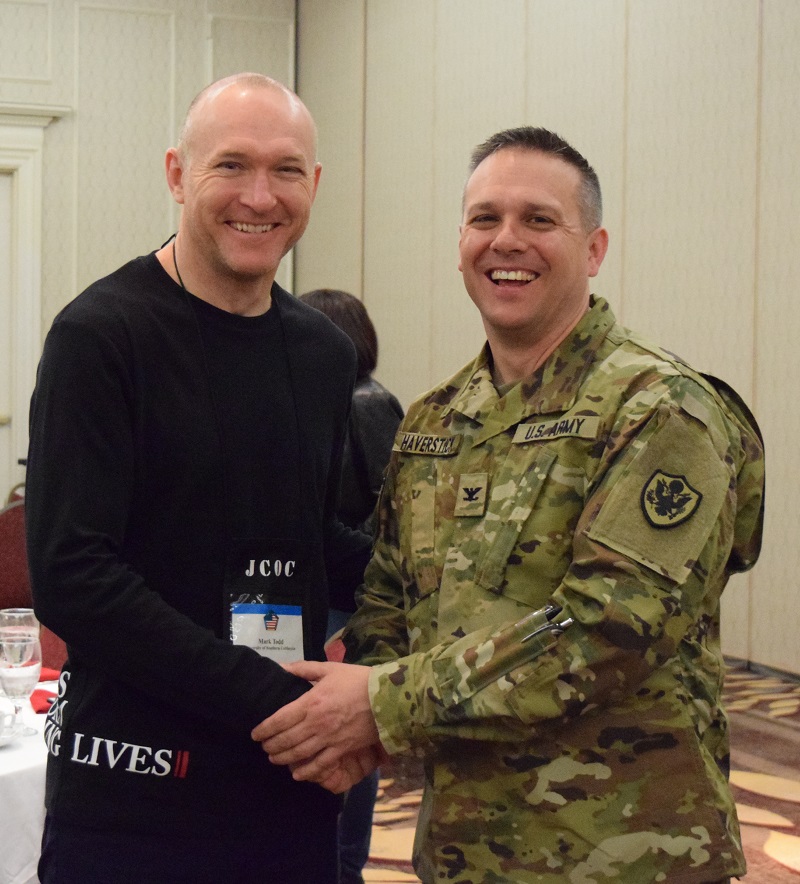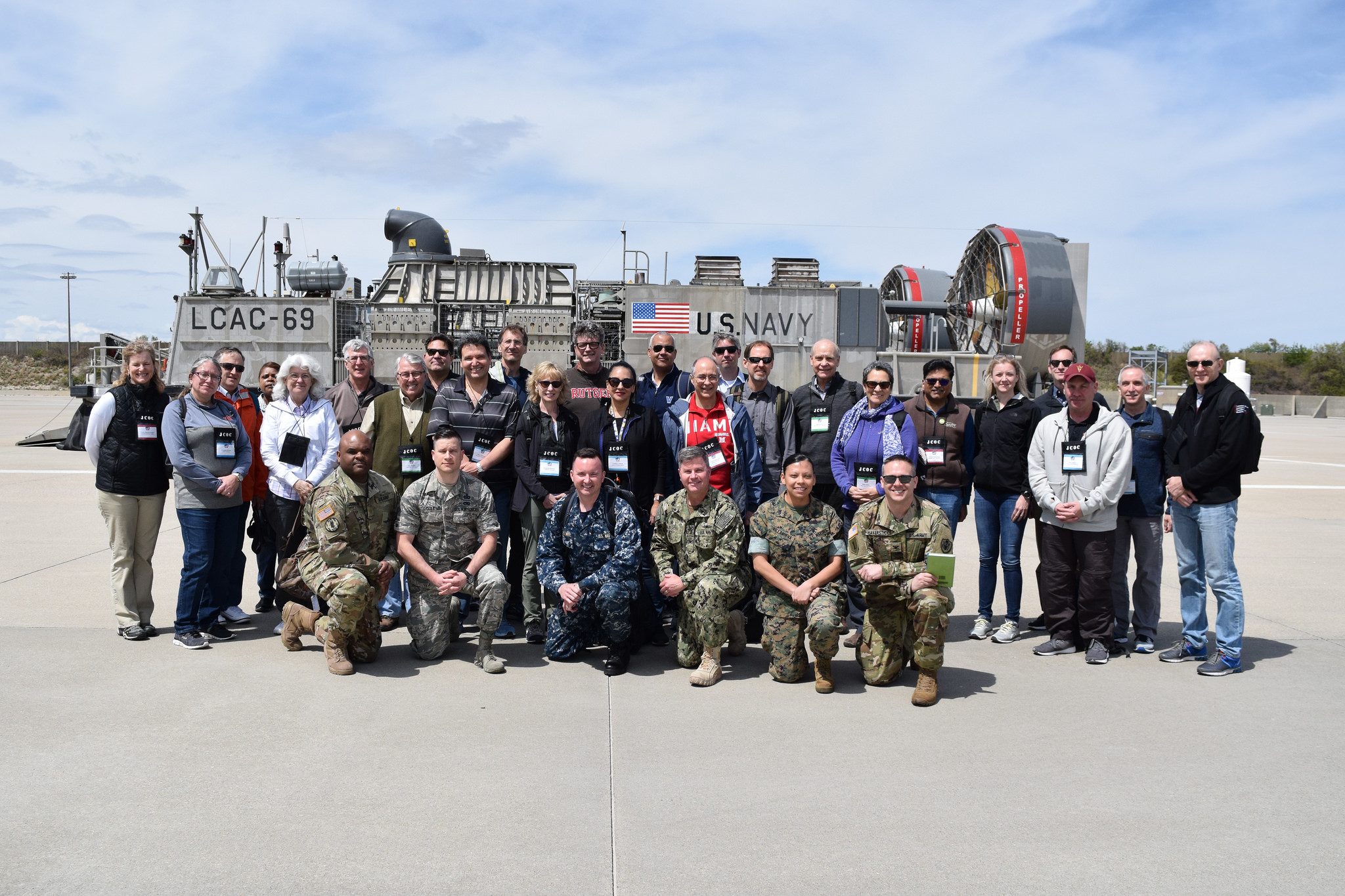USC excels in educating, training, and working with military veterans and their families. Since 1914, we have maintained a continuous relationship with the U.S. military, and we are one of only 60 schools to host all three ROTC programs on campus. This is one way we serve a nontraditional student population and how we continuously expand access to USC to create a rich and diverse student body.
Vice Provost of Academic Operations Mark Todd chairs USC’s Military Affairs Committee which coordinates USC’s military and veterans initiatives. In April he attended the Joint Civilian Orientation Conference (JCOC) – at the invitation of U.S. Defense Secretary James Mattis – in Norfolk, Virginia. He was one of an elite class of 24 participants that included Presidents, CEOs, Provosts, and Deans from top colleges and universities across the country.
The conference, a military tradition, aims to heighten public understanding of national defense by enabling leaders across sectors to directly observe and engage with the U.S. military. Units of the Army, Navy, Air Force, and Marines hosted the April JCOC, and they introduced the educators and administrators to military education and the training of service members. Mark received detailed briefings and met with senior Department of Defense officials.

He said this close exposure to military training deepened his appreciation for the innovative technologies deployed by our military and the incredible leadership and training that was demonstrated by the enlisted members of our armed forces. Not surprisingly, the topic of education came up in his conversations. “I had the opportunity to talk with many young enlisted soldiers, sailors, airmen, and marines about their educational aspirations both while they serve and once they transition out,” he said. “They have so much to offer a university campus and the least we can do is provide access and opportunity to a rigorous education that will allow them to develop into leaders in the community, businesses, and non-profit organizations. I am very proud of the work we are doing at USC to help our prior-enlisted veterans, and also officers, succeed and achieve their goals as civilians.”
Mark works with the dedicated leaders of all of our efforts to support student veterans on campus, in Los Angeles, and across southern California. An exhaustive list of names and initiatives is impossible here, but I did want to point out a few, including Randy Hill, our Director of the USC Institute for Creative Technologies, a DoD-sponsored University Affiliated Research Center, Carl Castro, the Director of our Center for Innovation and Research on Veterans and Military Families, Shahla Fatemi, our Manager of Military and Veterans Initiatives, Brandon Wexler, the current President of the USC Veterans Association (USCVA), and the commanding officers of our Navy, Army and Air Force ROTC Detachments.
Did you know that we enroll about 1,200 veteran students and dependents? This far outpaces the average of 700 across the 36 most selective universities in the United States. And did you know that we can offer an unlimited amount of undergraduate Yellow Ribbon fellowships for an unlimited amount of funding every semester? This means that eligible undergraduate veterans can graduate from USC debt-free. We are one of only nine private universities in the top 25 to offer this.
And you’re probably aware that General (ret.) David H. Petraeus is a Judge Widney Professor here, and he comes to campus a couple times a year. As Gen. Petraeus travels around the world, he frequently tells people that USC is the premier university for veterans and the military population. Here at USC, he works with us to bolster our academic initiatives and programs for veterans and he serves as a faculty advisor to the USCVA.
The country and the military community have taken notice of the efforts we’ve made. USC has risen almost 40 spots in just the last two years – into the top 20 – in Military Times’ Best for Vets Colleges ranking. U.S. News and World Report ranks us fifth among the Best Colleges for Veterans. We are proud that our military/veteran student course completion is 98%, mirroring that of their peers.
Programs unique to USC include a Pre-College Military Scholarship for the children of active-duty service members and veterans, sponsored by my office in partnership with schools across campus. This full scholarship brings high school military dependents to campus for a month. They stay in our dorms, pursue a course of study targeted to their interests, and get a taste of the college experience and life in Los Angeles – and three units of college credit. We want these young scholars – who come from all locations and backgrounds – to know that they can apply to schools like USC and succeed. And they do.
In August 2018, the USC Marshall School of Business will welcome the first cohort into its Veterans Transition Certificate Program, a first-of-its-kind program designed to ensure the successful transition of veterans and their families into civilian life. The initial cohort comprises Navy SEALs and their spouses, and they will join the program at no cost.

Mark is also active in expanding a USC tradition of honoring military-affiliated members of the Trojan family at an annual Veterans and ROTC Gala. This year, USC honored 21 alumni veterans of World War II and the Korean War, along with a group of Tuskegee Airmen. Alumna Lt. Gen. Stayce Harris, the first female African-American to achieve the rank of general in the U.S. Air Force, delivered the keynote speech.
We will soon be unveiling a new website, military.usc.edu, which will serve as USC’s central source for military/veteran programs, resources, and institutes. It is being designed to provide value for prospective, current, and ROTC students as well as for USC’s military alumni. We are proud of our longstanding tradition of support for the military, and I am grateful to Mark, who is consistently working with others on campus to expand college access and opportunity to America’s student veterans and improve our support of the military families in the global Trojan Family.
– Michael W. Quick, July 2, 2018
